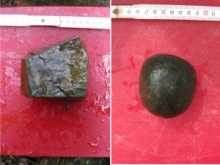Geophysicist's Finding May Tell Us Much About Rivers - Maybe Even on Mars

For centuries, geologists have recognized that the rocks that line riverbeds tend to be smaller and rounder further downstream, but they have not agreed on a reason for this pattern. Abrasion causes rocks to grind down and become rounder as they are transported down the river. Does this grinding reduce the size of rocks significantly, or is it that smaller rocks are simply more easily transported downstream?
In a study published the journal PLOS ONE, Douglas Jerolmack, an associate professor in Penn’s Department of Earth and Environmental Science, and mathematicians at Budapest University of Technology and Economics present a resolution to this problem in geology. The team’s model suggests that abrasion plays a key role in upholding these patterns, but it does so in a distinctive, two-phase process: Abrasion first makes a rock round. Only when the rock is smooth does abrasion act to make it smaller in diameter.
Not only does the model help explain the process of erosion and sediment travel in rivers, but it could help geologists answer questions about a river’s history, such as how long it has flowed. Such information is particularly interesting in light of the rounded pebbles recently discovered on Mars—seemingly evidence of a lengthy history of flowing rivers on its surface.
The research was supported by the Hungarian Scientific Research Fund and the National Science Foundation.
Read the full story here.





